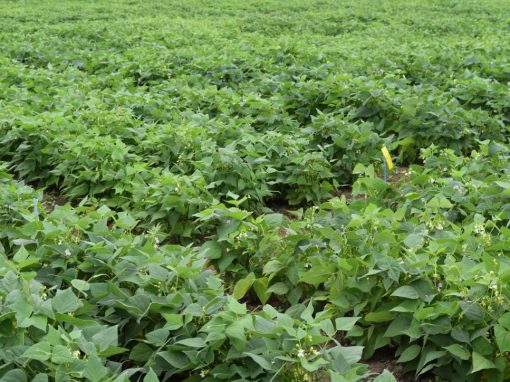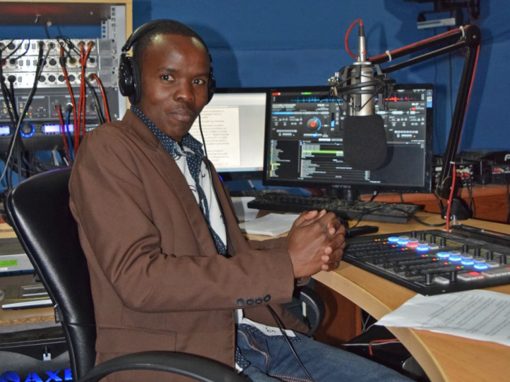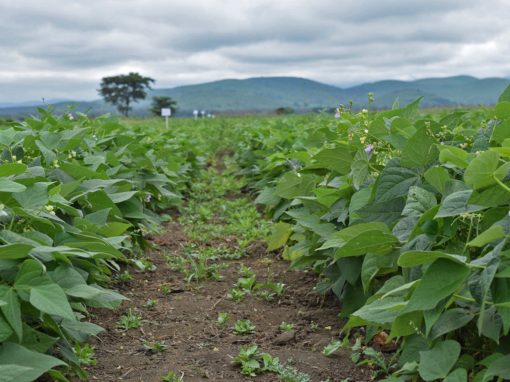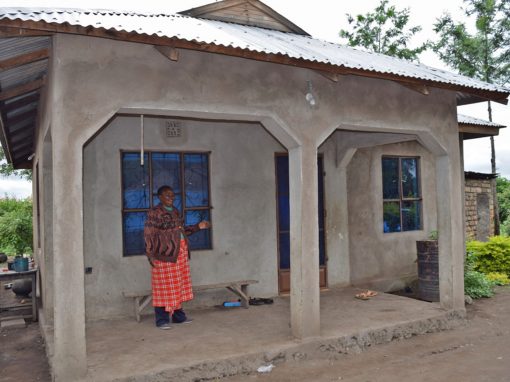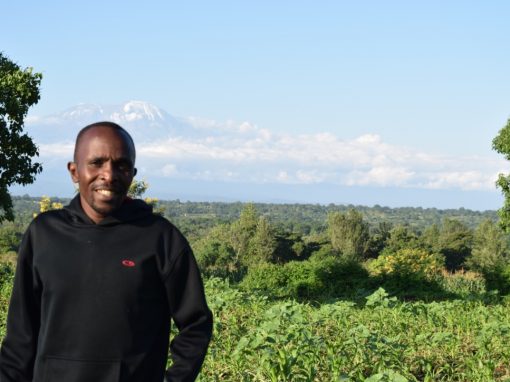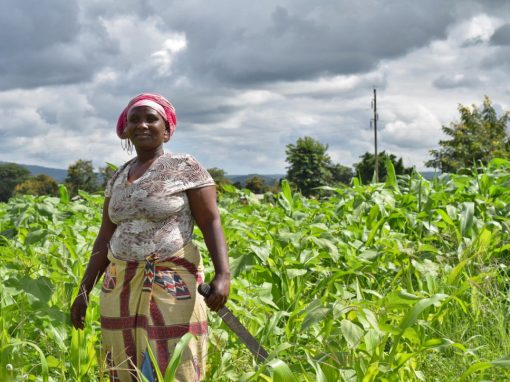The role of mass communication
PABRA and other projects can only impact the lives of farmers they can reach. Mass communication, specifically radio, plays a huge role in disseminating information about improved seeds and agronomic practices to smallholder Tanzanians.
Elisante Sandy has been farming for most of his life, but he still doesn’t truly know how, because he’s never really been taught, and he isn’t sure where to learn.
Improved bean varieties have been demonstratively successful on a farm-to-farm basis; products that have higher yields, are fortified with iron and zinc, and are climate-smart, have been shown to help farmers make more money, be healthier, and increase their food security.
But dissemination of the technology and products is difficult.
The Pan-African Bean Research Alliance (PABRA) — which specializes in breeding new bean varieties and tackling infrastructure problems preventing farmers form raising themselves out of poverty — relies on “extensionists,” outreach officers, to approach farmers and encourage them to adopt PABRA beans and farming practices, but with very few extensionists it is difficult to cover massive areas, and PABRA farmers remain few and far between.
PABRA currently employs little more than a handful of extensionists to reach the couple million farmers living in the northern region of Tanzania, and farmers are often separated by kilometres of poorly-maintained roads.
“We have learned over several decades of agricultural research that legumes in general are good sources of food,” said Marco Rondon, an International Development Research Centre (IDRC) project officer. “Overall it’s a good crop to move farmers into, but for those crops to be effective, they typically need to benefit from good agronomic practices and fertilizers.”
Rondon has been working at the IDRC for about 10 years. He is part of the food security team, which supports research in developing countries specifically geared towards smallholders and helping them become food secure. His expertise is mostly in climate change and agriculture, and he received his PhD from Cornell University.
Currently, he is working on a project with Farm Radio International, a Canadian not-for-profit organization, which works at gaining access to farmers and educating them about issues facing agriculture and farming. Last year, Farm Radio partnered with the IDRC for a new project to encourage bean farming as a way to increase food security.
The collaboration, called Scaling Up Improved Legume Technologies in Tanzania, uses the radio to bridge the communication gap between farmers and researchers through programming that puts experts in contact with smallholders.
“The team will evaluate the effectiveness of various communications tools, including radio programs, comics (targeted at youth), text messages, social media, point-of-sale information materials, and field days,” the project file states. “For example, radio programs will feature women and men farmers discussing the pros and cons of a particular practice and how it can help improve their family’s nutrition and household income.”
Rondon said that of the around two million farmers in the northern region of Tanzania — Arusha and Manyara in the context of this project — he estimates Scaling Up is reaching about 30,000 people. The project’s goal is to reach 100,000 by the project’s end in the spring of 2018.
“We are confident we might get there, or that we’ll get very close to that,” he said.
He added that around 500,000 people may listen to the show, but that doesn’t necessarily mean they’re implementing the technologies.
Christian Sumary is the radio host for the Farm Radio project. Most of the members of his family are farmers, but he went to school to study broadcast journalism, with a specialization in radio. He said that although he enjoys hosting news and current affairs shows, the farming project is close to his heart because his parents are smallholders.
“Because most of Tanzanians are farmers, they don’t have time for television or to read, but they have time to listen to the radio, especially because they can do that in the field,” he said.
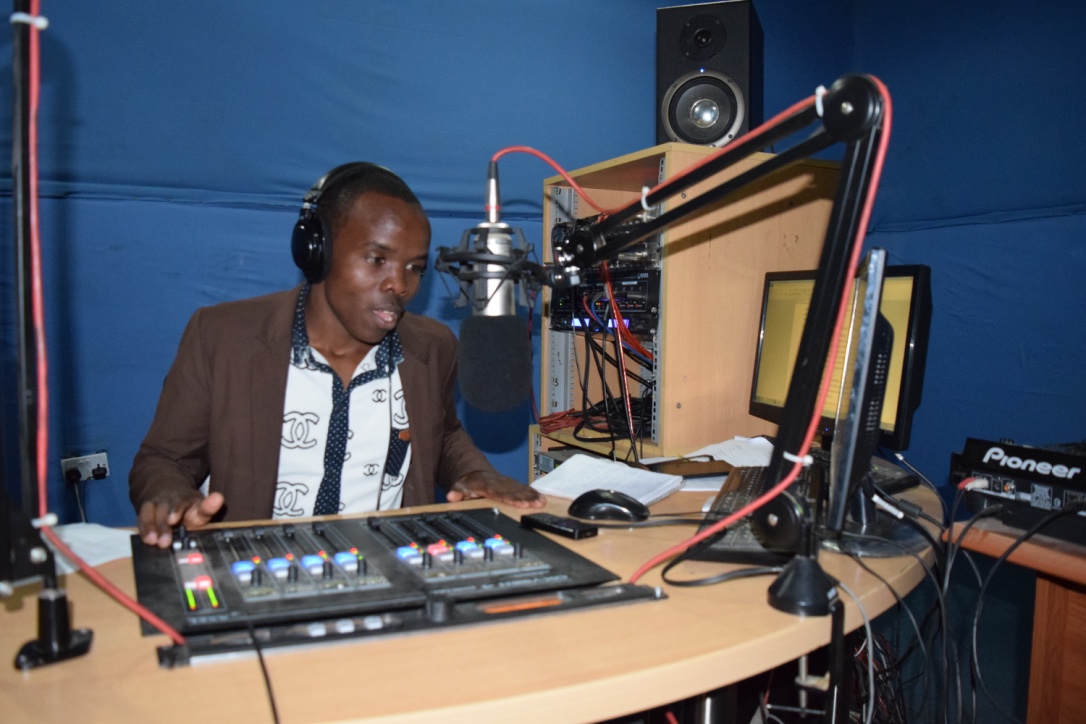
He said he and his colleagues have been running 16-week programs, one show a week, in the year since Scaling Up started. They take a couple of weeks between 16-week stints to regroup and reprogram.
Farmers are able to call in to the radio station throughout the week to ask questions, and those questions are answered on air the following week by an expert. Sumary said PABRA researchers are often expert panelists on his programs, because they cover topics ranging from trench-digging to market access.
He said he and his producers make an effort to address questions that are asked most frequently to attract listeners, but that performance, style, and the personality of the broadcasters themselves are equally important.
“You need to have something interesting to people, so that they listen to you,” he said. “Since we learned that, we’re trying to come up with something new every day that will interest our listeners.”
Mary Sengelela works at Farm Radio on the project, and is one of the people responsible for fielding listener questions and finding the appropriate experts.
“The content is led by farmers,” she said.
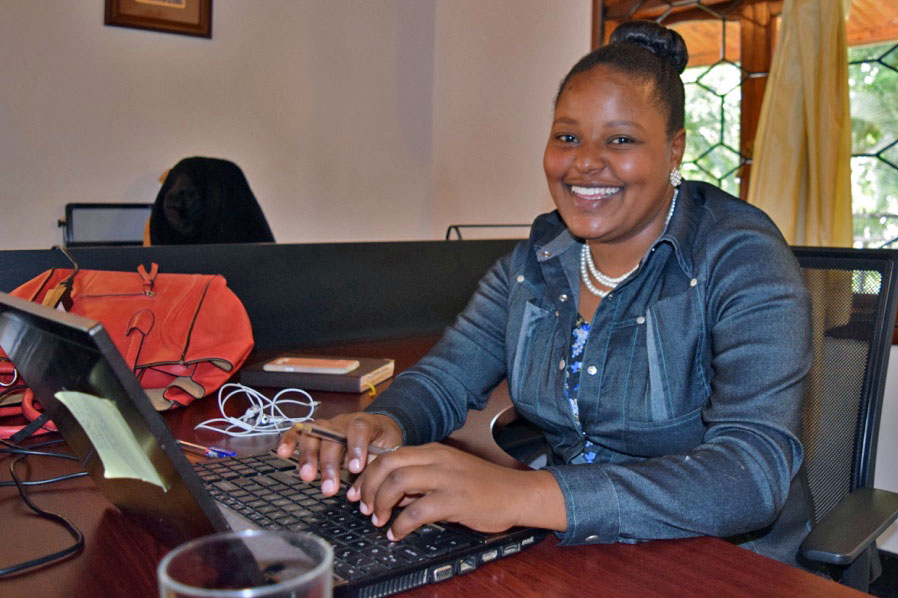
She and Sumary said the questions farmers ask most frequently are about diseased crops, and proper agronomic practices.
For example, many farmers do not provide proper spacing between their plants for maximum growth, and they do not dig trenches in and around their fields to retain water in the event of insufficient rainfall. Many often do not even plant in clear straight rows for organizational effectiveness.
Anything from the weather, to pests, to diseases can kill plants. Certain fungi can infest crops, causing them to “rust” — yellow, orange, or red powdery pustules appear along the leaves and kill the plant.
Beans undergo a process called biological nitrate fixation wherein they use soil bacteria called rhizobia in their roots to convert nitrogen in the soil into a more readily used form of the same substance, a nutrient in which many plants are often deficient. Beans require this process to properly mature, but many farmers do not know how to implement the proper crop rotation schedule to keep nitrogen in the soil, and there are environmental concerns surrounding the use of nitrogen fertilizer.
Tanzania approved the use of rhizobium-enhancing technology in 2015, but access to such products can be expensive and unreliable, even if farmers knew how to use them.
Another problem is that farmers often cannot pinpoint exactly what is damaging their yield. Last year, acres upon acres of Tanzanian bean plants turned yellow before they were ready to harvest, the cause of which most farmers were unsure, and all of those crops were lost.
Most subsistence farmers are also rainfall-dependent.
“Recently there have been more frequent and more severe droughts,” Rondon said. “That is the most significant issue. If the rains do not come, or they do not come for long, that affects everything.”
He added that a drought can result in an entire rain season being lost or seriously impacted, and that because the Farm Radio and IDRC project is only two and a half years long, when a season is lost, there’s not much time to recover data.
Although it’s becoming increasingly difficult to do, technologies exist — like those disseminated by PABRA — that could dramatically help farmers retain their yields.
“We know how to do it,” Rondon said. “The challenge is how to get more farmers to access those technologies.”
Farm Radio and PABRA both encourage the farmers they work with to have demonstration plots — a separate section of their land to test the technologies, so that they can see the difference between PABRA and non-PABRA yields — because often the problem is that reach does not equate to implementation.
Joanne Koola is a farmer two hours from Arusha who has been able to drastically improve her lifestyle, even three times upgrading her house, thanks to increased income from growing and selling PABRA beans. However, her direct neighbours, despite witnessing her success, have not implemented the technology and remain extremely vulnerable to climate and market changes.
“Farmers need to be educated,” Sengelela said. “Often the farmers learn but do not implement.”
“They have the information but they don’t take action,” she added.
The IDRC-Farm Radio project also endeavors to train 30 agro-dealers in the region on new technologies.
Rondon said it is hard to tell how well Scaling Up is doing, because it’s only nearing the end of its first year.
“It seems to be working fine, but we don’t have conclusive results yet,” he said.
A common issue is the number of farmers, like Elisante Sandy, who have been farming since they were children, but don’t yet know proper practices. They do not invest their money in improved seeds or their time on farming systems, but significant market and climate changes in the last quarter-century mean they’re farming under entirely different conditions from their parents who taught them.
Click above to read the next part of the story, or click below to navigate through different chapters.
